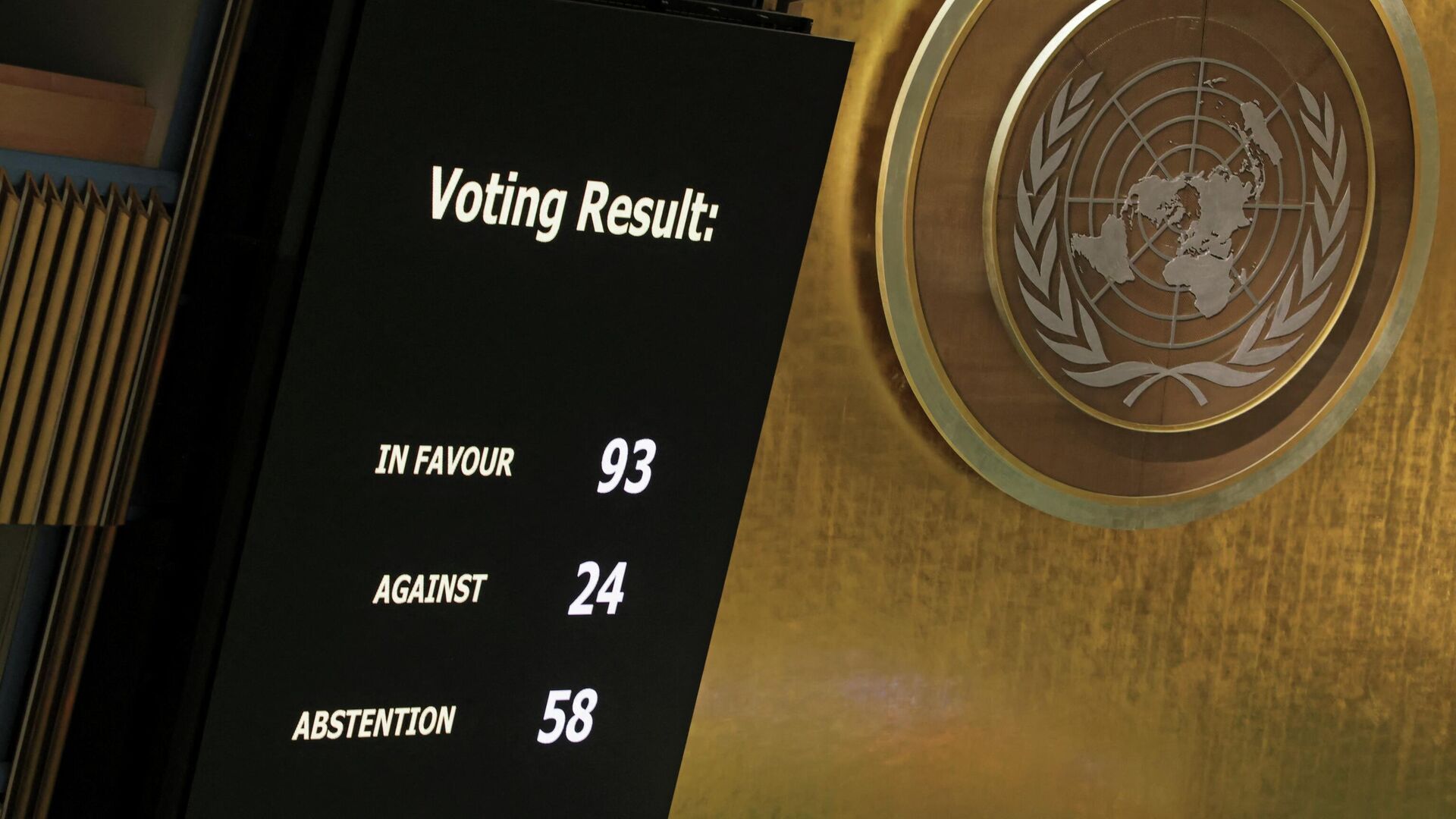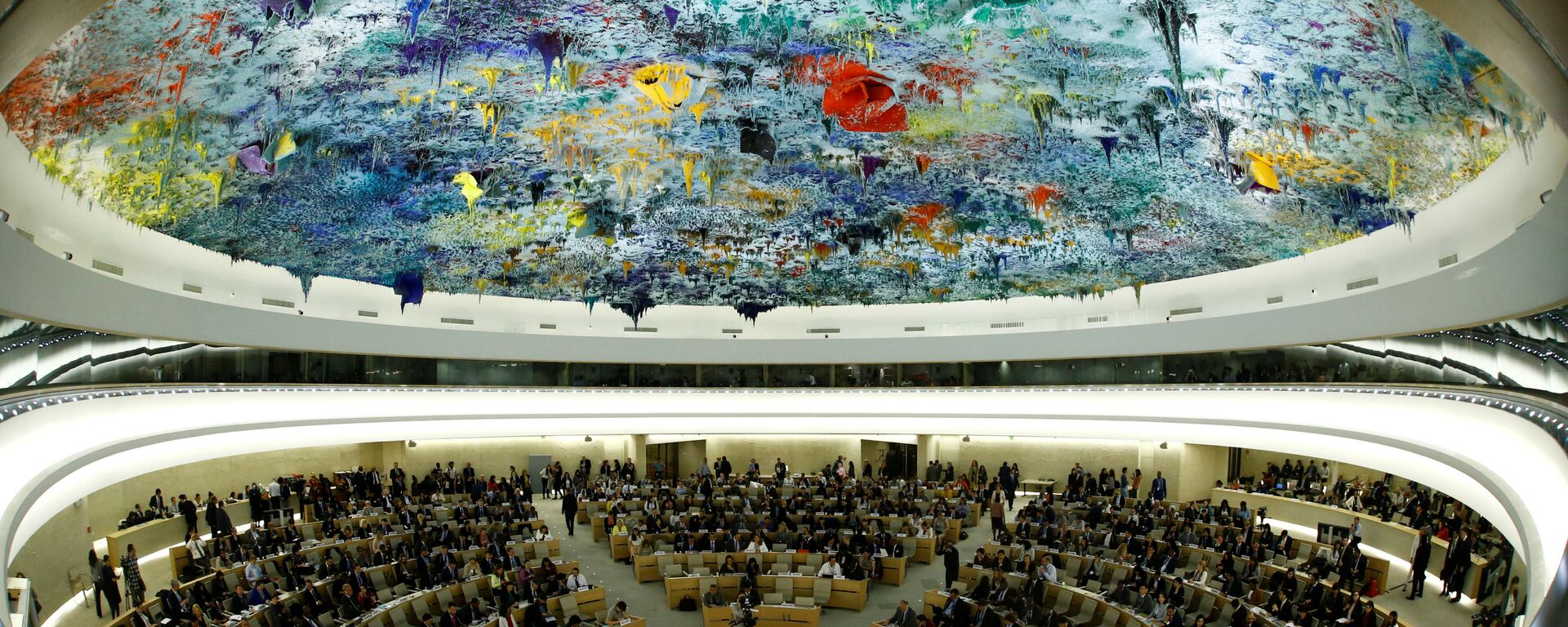https://sputnikglobe.com/20220409/nicaragua-says-russias-hrc-suspension-violation-of-intl-law-as-latam-powers-snub-us-led-vote-1094604841.html
Nicaragua Says Russia’s HRC Suspension ’Violation of Int’l Law’ as LatAm Powers Snub US-Led Vote
Nicaragua Says Russia’s HRC Suspension ’Violation of Int’l Law’ as LatAm Powers Snub US-Led Vote
Sputnik International
The Sandinista government’s condemnation of the Western campaign to remove Russia from the UN body highlights a large bloc of Latin American governments... 09.04.2022, Sputnik International
2022-04-09T00:43+0000
2022-04-09T00:43+0000
2022-04-09T00:54+0000
united nations human rights council (unhrc)
russia
west
latin america
nicaragua
human rights
https://cdn1.img.sputnikglobe.com/img/07e6/04/09/1094604796_0:320:3073:2048_1920x0_80_0_0_ffaf12d0175743106f14b3da5c3ccd7b.jpg
The Nicaraguan Foreign Ministry described efforts to suspend Russia from the United Nations Human Rights Council as a “violation of international law” and an act of aggression against the people of Russia. Managua voted against the US-backed resolution at the UN Wednesday, explaining in a press release issued Thursday that “any action aimed at excluding or suspending the participation of countries” is “incompatible with the Charter of the United Nations.”Meanwhile, regional powerhouses like Brazil and Mexico–whose combined GDP represents at least a whopping 60% of Latin America’s total–appeared to defy reported US pressure on UN member states to vote against Russia and abstained from voting on the matter. Nicaragua has stood firmly with the Russian Federation as it carries out its ongoing special military operation in Ukraine. Russian-Nicaraguan cooperation has been viewed with suspicion and resentment by Washington since the Soviet Union began helping Sandinista revolutionaries–who’d deposed a brutal American-backed dictator in 1979–to resist the resulting illegal US proxy war on Nicaragua which the CIA funded with cocaine profits in the 1980s. Now, with Russia back in the focus of US headlines, familiar Cold War-era attitudes aren’t far behind. In March, a senior program associate at influential pro-US thinktank Freedom House insisted in The Hill that Russia’s so-called “interference in Nicaragua” represents “a hemispheric threat.”But despite veiled threats from the US intelligentsia, Nicaragua hasn’t budged. And Nicaragua isn’t alone in resisting Washington’s efforts to draw the Global South into a new proxy war with Russia. Other countries in the region, like Bolivia and Cuba, voted down the measure as well. Cuba’s UN Ambassador, Pedro Luis Pedroso Cuesta, told the international body Wednesday that the removal of Russia from the Human Rights Council “will not favor finding peace, lasting and negotiated resolution to the conflict in Ukraine.” He cited a “serious risk” that the move would create a precedent that “could be used by specific countries that favor a double standard, selectivity, and polarization of human rights issues.”The country’s Middle Eastern allies, who’ve managed to retain their voting rights despite unilateral US sanctions, echoed Venezuela’s concerns.Syria’s permanent UN representative, Bassam al-Sabbagh, took a similar line, declaring that the “coordinated Western move to denounce the Russian Federation has no relation to human rights in Ukraine or any other country–rather, it is an effort by Western countries to impose their hegemony and control over the world through besieging Russia for its independent foreign policy.”The weightiest condemnation of the “hasty move” to strip Russia’s HRC membership over unconfirmed allegations of war crimes came from China, which argued that the US-led campaign was “adding fuel to the fire.”“Dealing with the membership of the Human Rights Council in such a way will set [a] new dangerous precedent, further intensify confrontation in the field of human rights… and produce serious consequences,” said Chinese Permanent UN Representative Zhang Jun.
https://sputnikglobe.com/20220408/some-countries-who-supported-russias-expulsion-from-unhrc-were-under-pressure---kremlin-1094587136.html
russia
nicaragua
Sputnik International
feedback@sputniknews.com
+74956456601
MIA „Rossiya Segodnya“
2022
News
en_EN
Sputnik International
feedback@sputniknews.com
+74956456601
MIA „Rossiya Segodnya“
Sputnik International
feedback@sputniknews.com
+74956456601
MIA „Rossiya Segodnya“
united nations human rights council (unhrc), russia, west, latin america, nicaragua, human rights
united nations human rights council (unhrc), russia, west, latin america, nicaragua, human rights
Nicaragua Says Russia’s HRC Suspension ’Violation of Int’l Law’ as LatAm Powers Snub US-Led Vote
00:43 GMT 09.04.2022 (Updated: 00:54 GMT 09.04.2022) The Sandinista government’s condemnation of the Western campaign to remove Russia from the UN body highlights a large bloc of Latin American governments asserting their independence from Uncle Sam.
The Nicaraguan Foreign Ministry described efforts to suspend Russia from the United Nations Human Rights Council as a “violation of international law” and an act of aggression against the people of Russia.
Managua voted against the US-backed resolution at the UN Wednesday, explaining in a press release issued Thursday that “any action aimed at excluding or suspending the participation of countries” is “incompatible with the Charter of the United Nations.”
Meanwhile, regional powerhouses like Brazil and Mexico–whose combined GDP represents at least a whopping 60% of Latin America’s total–appeared to defy reported US pressure on UN member states to vote against Russia and abstained from voting on the matter.
In his address before the UN, Mexico’s UN ambassador Juan Ramón de la Fuente declared that “to suspend” Russia “is not the solution” after Brazil’s Ronaldo Costa Filho warned, “We must at all cost avoid repeating the mistakes of the old commission on human rights–particularly concerning politicization, double standards, and selectivity,” which Filho called “the main flaw” of the UN’s previous human rights body, the UN Commission on Human Rights.
Nicaragua has stood firmly with the Russian Federation as it carries out its ongoing special military operation in Ukraine.
Russian-Nicaraguan cooperation has been viewed with suspicion and resentment by Washington since the Soviet Union began helping Sandinista revolutionaries–who’d deposed a brutal American-backed dictator in 1979–to resist the resulting illegal US proxy war on Nicaragua which the CIA
funded with cocaine profits in the 1980s.
Now, with Russia back in the focus of US headlines, familiar Cold War-era attitudes aren’t far behind. In March, a senior program associate at influential pro-US thinktank Freedom House
insisted in The Hill that Russia’s so-called “interference in Nicaragua” represents “a hemispheric threat.”
But despite veiled threats from the US intelligentsia, Nicaragua hasn’t budged.
In an apparent allusion to the current situation, Vice President Rosario Murillo stated in a speech Wednesday that “the world, and above all, the [international] organisms… who make up that human community, cannot afford to privilege some and condemn others.” Referencing the corporate media’s participation in the failed 2018 coup d’etat in Nicaragua, Murillo acknowledged “we are in a world where, unfortunately, tendentious communication and communication fabrications are used, manipulated, abused.” But “no matter how much nonsense, falsehoods, lies” Western decision-makers try “to impose, the truth always comes out,” she concluded.
And Nicaragua isn’t alone in resisting Washington’s efforts to draw the Global South into a new proxy war with Russia. Other countries in the region, like Bolivia and Cuba, voted down the measure as well. Cuba’s UN Ambassador, Pedro Luis Pedroso Cuesta,
told the international body Wednesday that the removal of Russia from the Human Rights Council “will not favor finding peace, lasting and negotiated resolution to the conflict in Ukraine.” He cited a “serious risk” that the move would create a precedent that “could be used by specific countries that favor a double standard, selectivity, and polarization of human rights issues.”
“Human rights shouldn’t be instrumentalized to attack sovereign nations,” agreed Venezuelan Permanent Representative to the United Nations Samuel Moncada. Venezuela almost certainly would have voted against the resolution but its voting privileges were suspended in January after US sanctions reportedly made it impossible for the country to pay its dues.
The country’s Middle Eastern allies, who’ve managed to retain their voting rights despite unilateral US sanctions, echoed Venezuela’s concerns.
“We are against the exploitation of UN human rights machinery for political ends,” noted Iran’s UN Representative Majid Takht-Ravanchi.
Syria’s permanent UN representative, Bassam al-Sabbagh, took a similar line, declaring that the “coordinated Western move to denounce the Russian Federation has no relation to human rights in Ukraine or any other country–rather, it is an effort by Western countries to impose their hegemony and control over the world through besieging Russia for its independent foreign policy.”
“When the United States and its allies destroyed the Syrian city of Raqqa and killed thousands of innocent people there, we did not see such international media and political mobilization to expose the perpetrators of human rights violations.”
The weightiest condemnation of the “hasty move” to strip Russia’s HRC membership over unconfirmed allegations of war crimes
came from China, which argued that the US-led campaign was “adding fuel to the fire.”
“Dealing with the membership of the Human Rights Council in such a way will set [a] new dangerous precedent, further intensify confrontation in the field of human rights… and produce serious consequences,” said Chinese Permanent UN Representative Zhang Jun.


